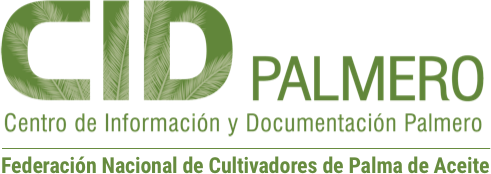| dc.creator | González-Delgado , Ángel Darío | |
| dc.creator | Barajas-Solano , Andrés F. | |
| dc.creator | León-Pulido, Jeffrey | |
| dc.date | 2021-12-23 | |
| dc.identifier | https://publicaciones.fedepalma.org/index.php/palmas/article/view/13656 | |
| dc.description | The African palm is the main source of vegetable oil worldwide, representing about 29.60% of the total oil and fat production around the world. The rapid expansion of this sector has faced several concerns related to environmentaland social aspects that have driven the search for sustainable alternatives. In this work, the inherent safety analysis and sustainability evaluation for the crude palm oil production process was performed using the inherent safety index (ISI) method and the sustainable weighted return on investment metric (SWROIM), respectively. The process was designed for a processing capacity of 30 t/h of palm bunches and under North-Colombian conditions. Three technical indicators were considered to evaluate the process sustainability including exergy efficiency, potential environmental impacts output (PEI output), and the total inherent safety index (ITI). The economic factor is directly considered since the SWROIM is an extension of the conventional return on investment (ROI). The resulting ITI at 11 indicated an inherently safe process, and the highest risk was observed for the process equipment safety subindex. The SWROIM reached a higher value (53%)compared to the conventional ROI (49.39%), which suggests positive impacts on sustainability. The novelty of this work lies in detecting the inherent risks and providing a decision making criteria for this project through a complete evaluation that relates economic, energy, environmental, and safety criteria. | en-US |
| dc.description | La palma africana es la principal fuente de aceite vegetal del mundo, ya que representa alrededor del 29,60 % de la producción global de aceites y grasas. La rápida expansión de este sector ha provocado varias preocupaciones relacionadas con aspectos ambientales y sociales que han impulsado la búsqueda de alternativas sostenibles. En este trabajo se realizó un análisis de seguridad inherente y se evaluó la sostenibilidad del proceso de producción de aceite de palma crudo utilizando el método del índice de seguridad inherente (ISI) y la métrica de rendimiento ponderado sostenible de la inversión (SWROIM por sus siglas en inglés), respectivamente. El proceso fue diseñado para una capacidad de procesamiento de 30 t/h de racimos de fruto de palma y bajo las condiciones del norte de Colombia. Se consideraron tres indicadores técnicos para evaluar la sostenibilidad del proceso, incluyendo la eficiencia exergética, el potencial de impacto ambiental (productos del PEI, por sus siglas en inglés) y el índice de seguridad inherente total (ITI). El factor económico se considera directamente, ya que el SWROIM es una extensión del retorno de la inversión (ROI) convencional. El ITI de 11 resultante indicó un proceso intrínsecamente seguro, y se observó el mayor riesgo para el subíndice de seguridad de equipos del proceso. El SWROIM alcanzó un valor más alto (53 %) en comparación con el ROI convencional (43,99 %), lo que sugiere impactos positivos en la sostenibilidad. La novedad de este trabajo radica en detectar los riesgos inherentes y proporcionar un criterio de toma de decisiones para este proyecto, a través de una evaluación completa que relacione los criterios económicos, energéticos, ambientales y de seguridad. | es-ES |
| dc.format | application/pdf | |
| dc.format | text/xml | |
| dc.language | spa | |
| dc.publisher | Fedepalma | es-ES |
| dc.relation | https://publicaciones.fedepalma.org/index.php/palmas/article/view/13656/13393 | |
| dc.relation | https://publicaciones.fedepalma.org/index.php/palmas/article/view/13656/13757 | |
| dc.relation | /*ref*/Rivera-Méndez, Y. D.; Rodríguez, D. T.; Romero, H. M. Carbon footprint of the production of oil palm (Elaeis guineensis) fresh fruit bunches in Colombia. J. Clean. Prod. 2017, 149, 743-750. [CrossRef] | |
| dc.relation | /*ref*/Fedepalma. Federación Nacional de Cultivadores de Palma de Aceite (Fedepalma) Statistical Yearbook. 2015. En The oil palm agroindustry in Colombia and the world 2011-2015; Área de Economía-UPSDS: Bogotá, Colombia, 2016. | |
| dc.relation | /*ref*/Fedepalma. La palma de aceite en Colombia. 2019. Recuperado de https://web.fedepalma.org/la-palma-de-aceite-encolombia-departamentos (consultado el 15 de septiembre de 2020). | |
| dc.relation | /*ref*/Ocampo-Peñuela, N.; García-Ulloa, J.; Ghazoul, J.; Etter, A. Quantifying impacts of oil palm expansion on Colombia’s threatened biodiversity. Biol. Conserv. 2018, 224, 117-121. [CrossRef] | |
| dc.relation | /*ref*/Castiblanco, C.; Etter, A.; Ramírez, A. Impacts of oil palm expansion in Colombia: What do socioeconomic indicators show? Land Use Policy 2015, 44, 31-43. [CrossRef] | |
| dc.relation | /*ref*/Rincón, L. E.; Moncada, J.; Cardona, C. A. Analysis of potential technological schemes for the development of oil palm industry in Colombia: A biorefinery point of view. Ind. Crop. Prod. 2014, 52, 457-465. [CrossRef] | |
| dc.relation | /*ref*/Umar, M. S.; Urmee, T.; Jennings, P. A policy framework and industry roadmap model for sustainable oil palm biomass electricity generation in Malaysia. Renew. Energy 2018, 128, 275-284. [CrossRef] | |
| dc.relation | /*ref*/Montoya, M. I.; Quintero, J. A.; Sánchez, Ó. J.; Cardona, C. A. Evaluación del impacto ambiental del proceso de obtención de alcohol carburante utilizando el algoritmo de reducción de residuos. Environmental impact assessment for ethanol production process using the waste reduction algorithm. Rev. Fac. Ing. Univ. Antioq. 2006, 36, 85-95. | |
| dc.relation | /*ref*/Ramírez-Contreras, N. E.; Munar-Flórez, D. A.; García-Núñez, J. A.; Mosquera-Montoya, M.; Faaij, A. P. C. The GHG emissions and economic performance of the Colombian palm oil sector; current status and long-term perspectives. J. Clean. Prod. | |
| dc.relation | /*ref*/2020, 258, 120757. [CrossRef] | |
| dc.relation | /*ref*/González-Delgado, A. D.; Peralta-Ruíz, Y. Environmental assessment of a crude palm oil production process under northcolombian conditions using war algorithm. Int. J. ChemTech Res. 2016, 9, 833-843. | |
| dc.relation | /*ref*/Martínez, D.; Puerta, A.; Mestre, R.; Peralta-Ruiz, Y.; González-Delgado, A. D. Exergy-based evaluation of crude palm oil production in northcolombia. Aust. J. Basic Appl. Sci. 2016, 10, 1-8. | |
| dc.relation | /*ref*/González-Delgado, Á.; Peralta-Ruiz, Y. A hierarchical techno-economic sensitivity approach for evaluation of agroindustrial production chains. Int. J. ChemTech Res. 2017, 10, 921-929. | |
| dc.relation | /*ref*/Subramaniam, V.; Hashim, Z.; Loh, S. K.; Astimar, A. A. Assessing water footprint for the oil palm supply chain-a cradle to gate study. Agric. Water Manag. 2020, 237, 106184. [CrossRef] | |
| dc.relation | /*ref*/Moreno-Sader, K.; Alarcón-Suesca, C.; González-Delgado, Á.-D. Application of environmental and hazard assessment methodologies towards the sustainable production of crude palm oil in North-Colombia. Sustain. Chem. Pharm. 2020, 15, 1-10. [CrossRef] | |
| dc.relation | /*ref*/Álvarez-Cordero, A.; De Ávila-Alvis, Y.; Ortiz-Rincón, M.; González-Delgado, A.; Peralta- Ruiz, Y. Environmental assessment of dual crude palm and kernel oil production in north-Colombia using WAR algorithm. J. Eng. Appl. Sci. 2017, 12, 7265-7271. | |
| dc.relation | /*ref*/Munasinghe, M.; Jayasinghe, P.; Deraniyagala, Y.; Matlaba, V. J.; dos Santos, J. F.; Maneschy, M. C.; Mota, J. A. Value–Supply Chain Analysis (VSCA) of crude palm oil production in Brazil, focusing on economic, environmental and social sustainability. Sustain. Prod. Consum. 2019, 17, 161-175. [CrossRef] | |
| dc.relation | /*ref*/Oliveira-Rodrigues, T.; Caldeira-Pires, A.; Luz, S.; Albuquerque-Frate, C. GHG balance of crude palm oil for biodiesel production in the northern region of Brazil. Renew. Energy 2014, 62, 516-521. [CrossRef] | |
| dc.relation | /*ref*/Heikkilä, A. Inherent safety in process plant design. VTT Publ. 1999, 384, 1-132. | |
| dc.relation | /*ref*/Sanjuan, M.; Tobon, K.; Meramo-Hurtado, S.; Ojeda, K.; González, Á. Bioethanol production process from palm rachis using the computer-assisted intrinsic safety index method. Int. J. Acad. Eng. Res. 2018, 2, 8-11. | |
| dc.relation | /*ref*/Meramo-Hurtado, S. I.; Ojeda, K. A.; Sánchez-Tuiran, E. Environmental and safety assessments of industrial production of levulinic acid via acid-catalyzed dehydration. ACS Omega. 2019, 4, 22302-22312. [CrossRef] | |
| dc.relation | /*ref*/Meramo-Hurtado, S. I.; Sánchez-Tuiran, E.; Ponce-Ortega, J. M.; El-Halwagi, M. M.; Ojeda-Delgado, K. A. Synthesis and sustainability evaluation of a lignocellulosic multifeedstock biorefinery considering technical performance indicators. ACS Omega 2020, 5, 9259-9275. [CrossRef] | |
| dc.relation | /*ref*/Denny, K. S.; Wendy, P. Q.; Mei, F.; David, L. Waste recovery and regeneration (regen) system for palm oil industry. Chem. Eng. Trans. 2015, 45, 1315-1320. | |
| dc.relation | /*ref*/Owolarafe, O. K.; Faborode, M. O. Micro-structural characterization of palm fruit at sterilisation and digestion stages in relation to oil expression. J. Food Eng. 2008, 85, 598-605. [CrossRef] | |
| dc.relation | /*ref*/Guillen-Cuevas, K.; Ortiz-Espinoza, A. P.; Ozinan, E.; Jiménez-Gutiérrez, A.; Kazantzis, N. K.; El-Halwagi, M. M. Incorporation of safety and sustainability in conceptual design via a return on investment metric. ACS Sustain. Chem. Eng. 2018, 6, 1411-1416. [CrossRef] | |
| dc.relation | /*ref*/El-Halwagi, M. Chapter 2-Overview of process economics. En sustainable design through process integration; Elsevier: Amsterdam, The Netherlands, 2012; p. 1561. | |
| dc.relation | /*ref*/Herrera-Rodríguez, T.; Parejo-Palacio, V.; González-Delgado, Á. D. Technoeconomic sensibility analysis of industrial agar production from red algae. Chem. Eng. Trans. 2018, 70, 2029-2034. | |
| dc.relation | /*ref*/Peralta-Ruiz, Y.; Saavedra, D.; González-Delgado, A. Exergy based evaluation of large-scale hydrogen production from African palm rachis. Aust. J. Basic Appl. Sci. 2016, 10, 168-175. | |
| dc.relation | /*ref*/Abusoglu, A.; Kanoglu, M. Exergetic and thermoeconomic analyses of diesel engine powered cogeneration: Part 1-Formulations. Appl. Therm. Eng. 2009, 29, 234-241. [CrossRef] | |
| dc.relation | /*ref*/Restrepo-serna, D. L.; Anderson, J.; Cardona-Alzate, C. A. Energy efficiency of biorefinery schemes using sugarcane bagasse as raw material. Energies 2018, 11, 3474. [CrossRef] | |
| dc.relation | /*ref*/Meramo-Hurtado, S.; Urbina-Suárez, N.; González-Delgado, Á. Computer-aided environmental and exergy analyses of a large-scale production of chitosan microbeads | |
| dc.relation | /*ref*/modified with TiO2 nanoparticles. J. Clean. Prod. 2019, 273, 117804. [CrossRef] | |
| dc.relation | /*ref*/Meramo-Hurtado, S. I.; González-Delgado, A. D.; Rehmann, L.; Quiñones, E.; Mehrvar, M. Comparison of biobutanol production pathways via acetone-butanol-ethanol fermentation using a sustainability exergy-based metric. ACS Omega 2020, in press. [CrossRef] | |
| dc.relation | /*ref*/Cárdenas, Y.; Orozco, I.; González, A.; Kafarov, V. Enviromental assessment of microalgae biosiesel production in Colombia: comparison of three oil extraction systems. Latinoam. J. Oil Gas Altern. Energy 2013, 5, 85-100. | |
| dc.relation | /*ref*/Meramo-Hurtado, S.; Alarcón-Suesca, C.; González-Delgado, Á. D. Exergetic sensibility analysis and environmental evaluation of chitosan production from shrimp exoskeleton in Colombia. J. Clean. Prod. 2020, 248, 119285. [CrossRef] | |
| dc.relation | /*ref*/Carvajal, J. C.; Gómez, A.; Cardona, C. A. Comparison of lignin extraction processes: Economic and environmental assessment. Bioresour. Technol. 2016, 214, 468-476. [CrossRef] [PubMed] | |
| dc.relation | /*ref*/Meramo, S. I.; Bonfante, H.; De Ávila-Montiel, G.; Herrera-Barros, A. Environmental assessment of a large-scale production of TiO2 nanoparticles via green chemistry. Chem. Eng. Trans. 2018, 70, 1063-1068. | |
| dc.relation | /*ref*/El-Halwagi, M. M. Sustainable design through process integration: fundamentals and applications to industrial pollution prevention, resource conservation, and profitability enhancement; Butterworth-Heinemann: Oxford, UK, 2012; ISBN 9781856177443. | |
| dc.relation | /*ref*/Do, T. X.; Lim, Y. Techno-economic comparison of three energy conversion pathways from empty fruit bunches. Renew. Energy 2016, 90, 307-318. [CrossRef] | |
| dc.relation | /*ref*/Moreno-Sader, K.; Meramo-Hurtado, S. I.; González-Delgado, A. D. Computer-aided environmental and exergy analysis as decision-making tools for selecting bio-oil feedstocks. Renew. Sustain. Energy Rev. 2019, 112, 42-57. [CrossRef] | |
| dc.relation | /*ref*/Gozmen S.¸anli, B.; Uludamar, E.; Özcanli, M. Evaluation of energetic-exergetic and sustainability parameters of biodiesel fuels produced from palm oil and opium poppy oil as alternative fuels in diesel engines. Fuel 2019, 258, 116116. [CrossRef] | |
| dc.rights | https://creativecommons.org/licenses/by-nc-nd/4.0 | es-ES |
| dc.source | Palmas; Vol. 42 Núm. 4 (2021); 33-49 | es-ES |
| dc.source | 2744-8266 | |
| dc.source | 0121-2923 | |
| dc.subject | SWROIM | en-US |
| dc.subject | ROI | en-US |
| dc.subject | Exergy efficiency, | en-US |
| dc.subject | Risks | en-US |
| dc.subject | African palm | en-US |
| dc.subject | SWROIM | es-ES |
| dc.subject | ROI | es-ES |
| dc.subject | Eficiencia exergética, | es-ES |
| dc.subject | Riesgos | es-ES |
| dc.subject | Palma africana | es-ES |
| dc.title | Evaluating the Sustainability and Inherent Safety of a Crude Palm Oil Production Process in North-Colombia | en-US |
| dc.title | Evaluación de la sostenibilidad y seguridad inherente de un proceso de producción de aceite de palma en el norte de Colombia | es-ES |
| dc.type | info:eu-repo/semantics/article | |
| dc.type | info:eu-repo/semantics/publishedVersion | |


